
 |
|
|
|
Director Roger Corman became a first-rank filmmaker on his ambitious Civil Rights film The Intruder, using his formidable guerilla techniques on location in the South. Instead of avoiding Guild regulations, he only had to dodge sheriffs aware that he was making a pro-integration movie. Several years later Corman again broke away from studio work to transcend the youth-problem exploitation dramas of the previous decade. His first real breakout non-horror film The Wild Angels revived an old subgenre, taking up the slack left by Laslo Benedek's 1953 The Wild One, with Marlon Brando. The studios had shunned more movies about biker gangs, as if fearful of encouraging social disorder. With the Hell's Angels making headlines Corman contacted a local chapter and penciled in an agreement to cooperate on a movie. After three years of Beach Party comedies, A.I.P.'s Jack Nicholson and Sam Arkoff were ready to be talked into a tougher kind of youth delinquency movie. 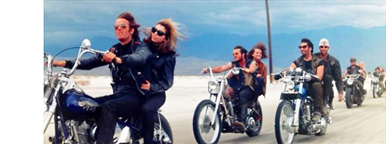
The show was filmed on the go in Los Angeles, the Palm Springs area and up in the local mountains. Biker Heavenly Blues (Peter Fonda) liberates his closest buddy Loser (Bruce Dern, sensationally good) from his job on an oil well and launches his Venice chapter of the Hell's Angels on a road trip to recover Loser's stolen chopper motorcycle, rumored to be in a desert border town called Mecca. While the rest of the bunch party in a canyon oasis watched over by the Highway Patrol, Blues and a few picked bikers invade Mecca and start a fight with local Mexican-Americans. Loser steals a cop's Electra Glide but can't evade the law; he's shot in the back for his trouble, and arrested. With the help of his girlfriend Gaysh (Diane Ladd) and Blues' 'old lady' Mike (Nancy Sinatra), Blues engineers a bust-out from the prison ward -- even though Loser is sure to die without medical aid. As the authorities close in, Blues is increasingly troubled: he wants to defy 'the man' and his corrupt system, but other than an undefined rage, he can't pin down his personal feelings about anything. The Wild Angels starts brilliantly, with loner rebel Fonda introduced as a new icon, an anti-matter Shane on a chopper bike, the kind of thug hero who frightens women and children. Corman casts the old stock-company stars of his A Bucket of Blood (Barboura Morris and Dick Miller) as straight members of the establishment, cowering before the threat of the biker hero. With a new cameraman to replace his stalwart Floyd Crosby, Corman paints an accurate picture of the Hells' Angels, and particularly their stomping ground in the back-county Inland Empire desert communities south of Palm Springs. Corman's previous no-budget filmmaking habits are set aside. His Panavision camera shows us the canals of Venice long before the condos moved in, and the desert as the untraveled semi-frontier it still resembled. Corman applies his excellent instinct for camera placement to a loose plot that allows free-form improvisation. Shot after shot seems to cooperate with this approach. The desert skies darken as the Angels invade the lower desert. Corman appears receptive to random events and visual opportunities. A bit of affectionate business during the raid between Dern and a horse has a refreshing accidental quality. 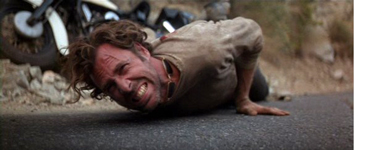
The Wild Angels is dangerous in a way that its copycat biker follow-up films are not. This is 1966, and American feature films just didn't tell stories like this one. Criminals in Hollywood dramas were unerringly written as being after money, a motivation that straight society could understand and morally pigeonhole. As written by Charles B. Griffith, Peter Fonda's Heavenly Blues is a more complicated antisocial outlaw, not a romantic bandit hero. Blues' bullheaded hatred for authority does endears him only with other malcontents. He's also just plain mean. Griffith and Corman show this right up front, in a brilliant opening. The little boy on the tricycle might be a future biker, in the larval stage. A fearful mother (Barboura Morris) restrains the tyke from running wild. Blues isn't under the supervision of anyone: he's male instinct without external restraints. Here's a 'hero' who basically condones killing cops and believes in the personal freedom to rape and murder as his mood dictates. His idea of Freedom is that the rejection of society is its own justification. The anarchy that ensues was shocking in 1966. Just a couple of years before, our culture's idea of a big debate on youth was whether or not the Beatles' hair was too long. Corman's longhairs wear Iron Crosses and swastikas. His biker sluts party in the desert in their underwear. They orgy in the cactus, in flophouses, and after assaulting a minister, in a church. For most of the picture, only the briefest of hints (a radio snippet with news about Vietnam) place this rebellion in any context. With the exception of the posing and preening of star Peter Fonda, The Wild Angels plays fair with its extreme content. The Angels are a pack of greasy thugs, unromantic and unenlightened. Their attack on the Mexicans in Mecca starts with ethnic taunts usually associated with the lowest of western baddies. The straights, especially the cops and doctors at the hospital, are decent men trying to help Loser. We aren't really happy to see the Hell's Angels 'rescue' him, especially when one of them molests a nurse (a black nurse, pointedly) during the raid. Tensions rise as the uncouth rescuers drink beer and stare stupidly while their comrade bleeds to death, with a baby crying and nobody in charge. Their leader Blues has no judgment whatsoever. Betraying his gang every bit as much as Pike Bishop betrays his own Wild Bunch, Blues is fundamentally as fascist as his leather uniform and his Nazi insignia. He preaches power but has no principles. He prefers the deafening roar of his chopper - a machine of intimidation. 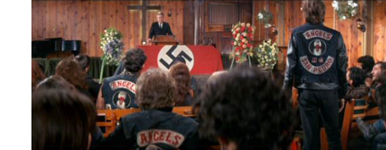
For a supposedly radical statement, The Wild Angels makes an excellent case for the straights. At the ideological showdown 1 , a sympathetic preacher (Frank Maxwell, the righteous liberal of The Intruder) is willing to say final words over Loser, even behind an altar draped with a swastika. The obstinate Blues returns his kindness by loudly rejecting his God and trashing his church. The final ugly scene in the wrecked pews and desecrated altar is a truly chaotic mess of dancing, drinking and blasphemy, where the action not only seems improvised, but out of control. The corpse is pulled from its coffin for fun and games. The widow, the only character to whom we have a sentimental attachment, is raped. The leader who wanted to do right by his best friend just lets it all happen, shoving his steady girl away and taking another behind the altar for a quick lay. It's strong stuff even now. In 1966 many a neighborhood exhibitor must have thought the world was coming to an end. The handsome Peter Fonda finally found a marketable ultra-cool 'look' in this movie, even if he never became an expressive actor. Bruce Dern is five times the performer� when he's on screen it's like Fonda is made of tissue paper. Likewise Nancy Sinatra's inability to play a deep scene is not a big factor; the script does the work for her. Griffith gives her a clever switch to play, between sullen biker chick and a good Mary Tyler Moore imitation. 2 Young Diane Ladd stands out in a more emotionally demanding part. A pre- Bonnie & Clyde Michael J. Pollard, and a post- The Apartment Joan Shawlee fit in well. The rest of the gang is alarmingly realistic, even if the bikers never look quite nasty enough to be real. Where are the fat bikers? At least the biker chicks aren't too uniformly attractive. 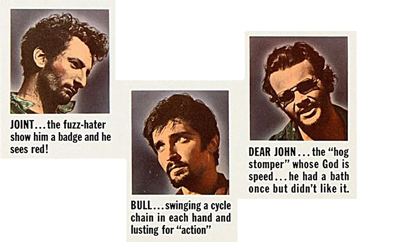
In his autobiography Roger Corman proudly outlines the film's status as an outlaw affair, with cops trailing his production through the desert. The fuzz reportedly sought out ways of shutting the production down, all the while outfoxed by Corman's band of filmmakers, actors, and real Hell's Angels. The studio's key still book for the film contains dozens of behind the scenes photos that would have made a wonderful extra. Soon to become an accomplished director himself, film critic and director's assistant Peter Bogdanovich crashed the many of the behind-the-scenes shots, frequently posing as if he's in charge. A key book is usually a pretty random assortment of stills, but Bogdanovich shows up more often than does the director. As Corman's assistant he was heavily involved in the shooting, and at the conclusion can be seen as an extra, watching the bikers ride into the mountain town. Another up-and-coming Corman acolyte, editor Monte Hellman, apparently couldn't compete with Bogdanovich's skill at nailing the publicity. And forget about a promotional presence for Corman's eternal writer Charles B. Griffith. Although Corman is generous with praise, Griffith never seems to get enough credit for his dozens of ingenious scripts. This one is a model of on-target simplicity. The Wild Angels pretty much inaugurated the 'youth revolution' subgenre, the rough pictures that supplanted slop like Mrs. Brown You've Got a Lovely Daughter with fare such as Robert Thom's Three in the Attic and Wild in the Streets. But it would mark the beginning of the end for Corman as a movie director. After ten years of indulging every youth fad, A.I.P.'s Arkoff and Nicholson resisted the extremes of The Wild Angels. Some offensive bits were trimmed from the church orgy. Corman rebelled when wider editorial license was taken with his later The Trip. When A.I.P. re-cut his Gas-s-s, Corman finally broke off relations, soon ceased directing, and formed his own distribution company. 
Olive Films' Blu-ray of The Wild Angels gives us the wide Panavision images in complete clarity; when the bikers prowl the desert the movie resembles a western. Film damage is slight and the colors are fine. The sharpness of the HD images becomes apparent whenever a slightly out-of-focus shot pops up� make movies this fast, and mistakes get made. Although no longer all that familiar today, Davie Allen and the Arrows' grinding-guitar Blues Theme was the signature anthem for chopper bikers, matched only by a better-remembered tune by Steppenwolf. It still sounds great behind the main titles. 3 Producer Corman would never spend for a wall-to-wall musical carpet of needle-drop hits, which distinguished Easy Rider three years later. Music producer Mike Curb provides the dull, sometimes inappropriately cheerful balance of the score. Curb's political opponents later used his involvement in exploitation pix to scotch his campaign for California office (governor?). The only extra on the disc is a fun trailer that doesn't know how to sell the film, using old-fashioned graphic titles and lame narration: "If you're a 'mama', you're every man's woman!" Olive Films is foregoing most extras this season, which in some cases is forcing us to retain old MGM DVDs of these films. 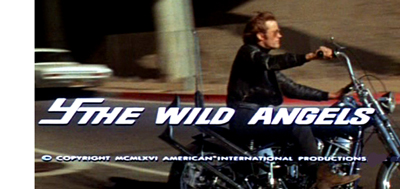
Roger Corman always surrounded himself with hungry Hollywood fringe talent, and one gets the feeling in The Wild Angels that he finally let their wilder instincts come to the fore. For all its purported exploitation roots this is a serious film, powerful enough to make its art-movie existentialist ending work for most audiences: "There's no place to go". It all depends on whether one can overlook Peter Fonda's wooden performance. Angels is too caustic to be harmless and too intelligent to be ignored. And nobody can claim that it compromises with its tough subject. The Wild Angels incorporates a swastika into its title logo treatment. ↑ Corman must have had to put up a fight to get that graphic past Arkoff and Nicholson...
On a scale of Excellent, Good, Fair, and Poor,
The Wild Angels Blu-ray rates:
Footnotes:
1. Corman often arranges for an establishment spokesman to pronounce verdicts over his wayward heroes. The preacher's thoughtful attempt here is beautifully handled, unlike the stiff revivalist in Corman's earlier genre offering "X" - The Man with the X-Ray Eyes. Likewise, the graveyard ending seems an inversion of a scene from a Corman Poe adaptation.
2. Nancy Sinatra's faux- tough broad recording-star persona is particularly well used when she dresses 'straight' to spearhead the invasion of the clinic. It's reminiscent of a scene in The Battle of Algiers where the Algerian rebels give an African woman a French colonial makeover so she can smuggle a bomb through a military checkpoint. When the 'straight' Nancy charms the cops, the 'Angels vs. Everyone' total political alienation is complete.
3. The Venice canals in the opening are still around these days, but the real estate has become so pricey that the whole area is covered with expensive townhouses and apartments. Heavenly Blues is seen riding down the Pacific shore. He hops onto the Santa Monica Freeway and then is seen driving Northward up Overland Ave., heading from Venice Blvd to the top of the hill. The street has since been widened. We UCLA students frequented University Stereo on the right, which for a while operated out of a garage. You know, record turntables, amps and giant speakers. Gotta have giant speakers.

Reviews on the Savant main site have additional credits information and are often updated and annotated with footnotes, reader input and graphics.
Review Staff | About DVD Talk | Newsletter Subscribe | Join DVD Talk Forum |
| ||||||||||||||||||